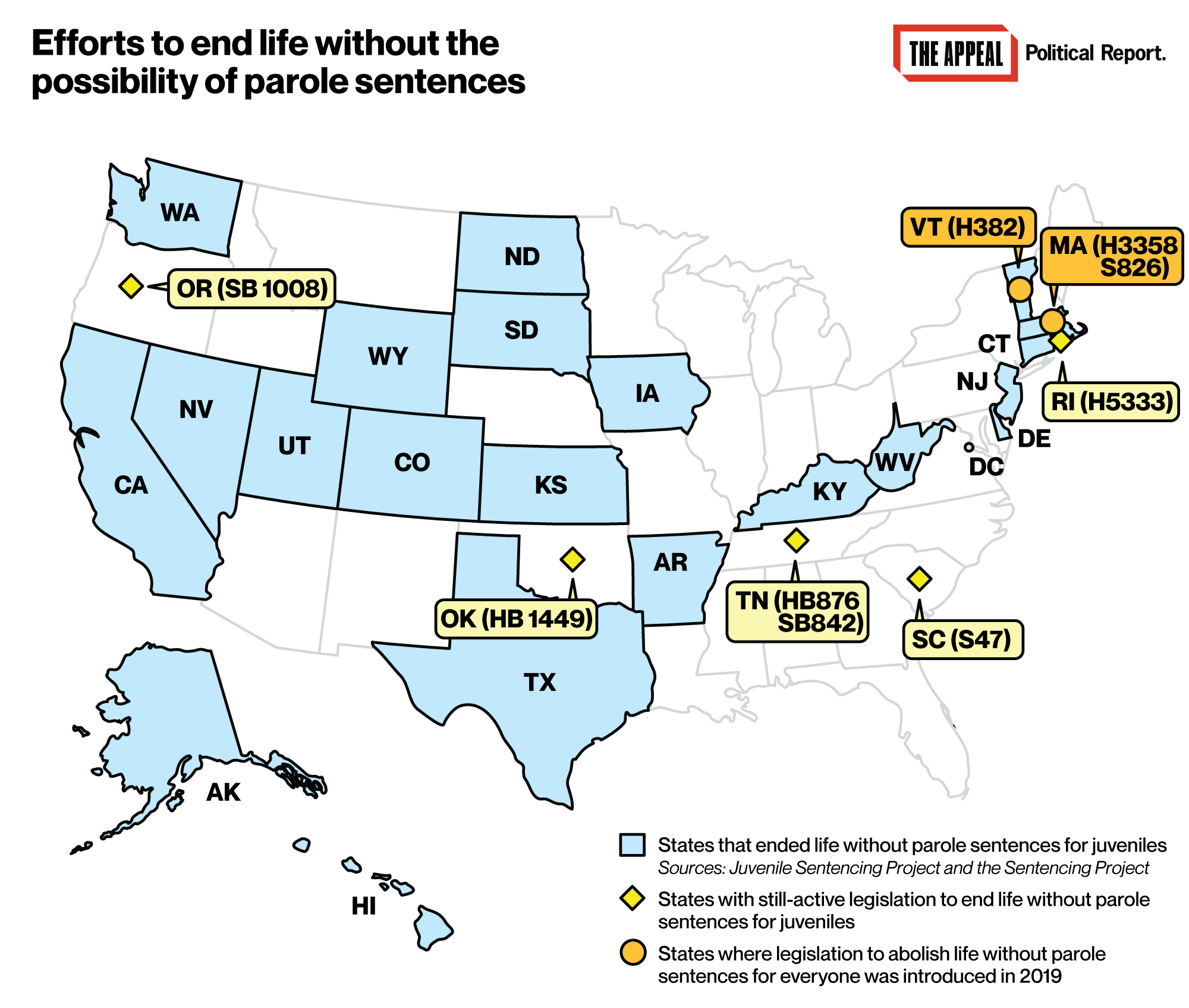Political Report
Criminal Justice Reform in the States: July 19, 2019 edition
Legislative Roundup: New Jersey adopts rare restrictions on solitary confinement, Missouri reform will cut prison population, and more
Legislative Roundup: New Jersey adopts rare restrictions on solitary confinement, Missouri reform will cut prison population, and more
Many of the laws that govern the American criminal justice system are set at the state level. Explore the latest developments on criminal justice reform in state legislatures around the country with the Political Report’s interactive tool. Updates drawn from the Political Report newsletter, written by Daniel Nichanian.
Alaska
Alaska continues to roll back the decarcerative reforms it adopted in 2016, Zachary Siegel reports in The Appeal. The latest law was championed by Mike Dunleavy, a Republican who was elected governor in 2018 on a platform to “Make America Safe Again.” Siegel reports that it “makes simple drug possession an arrestable offense and adds years of sentencing on to various crimes that reforms had previously reduced.” These changes may lead the state to reopen Palmer prison, which was closed in 2016. Alaska had already reversed some decarcerative reforms in 2017, just a year after adopting them.
Hawaii
Hawaii Governor David Ige vetoed a series of criminal justice reforms last week. Among other proposals, he killed a measure to restrict the state’s embattled civil asset forfeiture programs and another for terminally ill incarcerated people to be eligible for medical release. “There’s longstanding deference to police and law enforcement in our state,” Mandy Fernandes, policy director of the ACLU of Hawaii, told the Political Report. Ige allowed a bill decriminalizing the possession of small amounts of marijuana to become law without his signature. The bill falls short of reforms other states have recently implemented. Read more in the Political Report.
Missouri
A new Missouri law, sponsored by Republican Representative Bruce DeGroot, is projected to cut the prison population by approximately 3 percent by the 2023 fiscal year. For some lower-level offenses, the law waives the “Truth in Sentencing” requirement that people serve a set percentage of their terms before being eligible for probation, parole, or early release. The reform also targets debtors’ prison: Missouri courts charge people the cost of holding them in jail, but this law bars incarceration on the grounds that they have not paid those fees.
New Jersey
New Jersey has restricted solitary confinement, a practice by which state prisons torture people for months or years on end. A new law, signed by Governor Phil Murphy last week, creates a limit of 20 consecutive days and 30 days over a 60 day-period. New Jersey is the first state to adopt such a time limit through law; Colorado has implemented a 15 day-limit administratively. Vox calls it “the most progressive legislative reform to the practice of solitary confinement in the U.S.” New Jersey’s reform was championed by activists organized around the Campaign for Alternatives to Isolated Confinement (NJ CAIC). Advocates pushed for a time limit in New Mexico and New York this year, but those proposals failed.
Pennsylvania
A new law will enable the state attorney general to prosecute firearm violations in Philadelphia. The move, which dilutes DA Larry Krasner’s authority, applies only to Philadelphia and expires in two years, right when Krasner’s current term ends. The bill’s GOP sponsor implied to The Intercept that he was motivated by his view that Krasner, who has used probationary programs, was not “enforcing the law.” Democratic Governor Tom Wolf signed the bill into law. In response to the ensuing controversy,” Attorney General Josh Shapiro tweeted that he had asked for concurrent jurisdiction in the entire state, and that he did not plan “to use it to act unilaterally or go around DA Krasner.” When demonstrators confronted him on this issue, Shapiro said he would support repealing the law, and he answered in the affirmative when asked if he would “commit to not using” it.
Texas
When Texas legalized hemp this year, it distinguished it from marijuana based on THC concentration: If a product has more than 0.3 percent THC, it is defined as marijuana and is illegal. But an unintended consequence is that marijuana cases now require knowing a product’s THC level, and many DAs say they lack the resources and capacity to make this determination. The statewide group that lobbies on behalf of Texas DAs warned that this “evidence can come only from a laboratory capable of determining that type of potency—a category which apparently excludes most, if not all, of the crime labs in Texas right now.” At least five DAs (in Bexar, Harris, Fort Bend, Nueces, and Tarrant counties) have announced that they will no longer prosecute marijuana cases absent a THC concentration test. These DAs have dismissed hundreds of marijuana cases since the law came into effect in June.
But Montgomery County DA Brett Ligon said he will not follow suit. Asked how his office would prove that a substance is marijuana, a spokesperson told the Political Report that they have identified a private lab capable of conducting tests in Arlington, and that they would order a test only if a case goes to trial (which is rare) or if defendants request it in cases disposed of pretrial.


